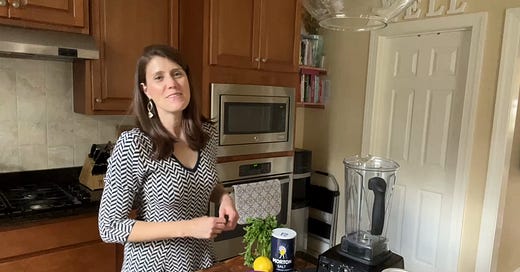Photo by Cristiano Pinto on Unsplash
We all know the old adage, “when you fail to plan, you plan to fail.” While there are exceptions to the rule, planning, sets us up for success, especially when we want to improve our eating habits. I know this is true for my clients who are working on changing their food habits to manage various medical conditions.
Yet, as a dietitian and a person trying to manage making healthy choices for myself and my family, the decision-making surrounding meal preparation can be exhausting. Think about how many decisions are involved in coordinating a meal plan for the week. It’s not just about the meal. It’s about time, resources and the ability to navigate our complex food system that can make selecting a jar of marinara seem overwhelming.
In the interest of time (ha!), I want to share my top three tips for making meal planning easier. After working as a dietitian for more than fifteen years, I’ve found that if you can embrace at least one of these concepts, you have a much better chance of mastering your own meal planning.
Tip #1: Learn to Love Lists
Photo by Marten Bjork on Unsplash
List making is a key component to meal planning. I always suggest my clients start by making a list of some of their favorite meals and those that are easy to prepare on the weekdays. This list can be ongoing, meaning you add more meals after experimenting with new recipes.
The worst meal planning strategy involves an entire week of new meals with new recipes. It just doesn’t set you up for success, which is why I absolutely hate programs that provide a “standardized meal plan.” Standardized meal plans are rarely used long-term and aren’t habit-creating tools. Avoid these blanket meal plans and instead start with the basics. Almost any meal plan, even with the need for dietary changes, can be improved and modified to keep the essence of the original recipe or flavors.
After, you’ve created seasonal lists of meals you enjoy, the next step is creating an ongoing grocery list to keep your pantry and refrigerator stocked with those items needed to make some of those meals. Building a well-stocked pantry and refrigerator can take time. If you are on a tight budget, consider just purchasing one or two extra items each grocery trip.
Tip #2: Monotony is Ok, Sometimes
Photo by Louis Hansel on Unsplash
There is a lot to be said for having a varied diet, especially when it comes to improving health and our gut microbiome. Yet, monotony in meal planning can be OK, at times. Love having the same breakfast most mornings or keeping lunch simple and having one or two different options? Give yourself permission to incorporate some repetition in your weekly meal plan to ease the decision-making fatigue. You might get some relief on your food budget if you decide to make oatmeal a few days of the week for breakfast or stick with vegetable wraps or entrees salads for lunch. Remember, one of the most important aspects of meal planning or any planning is to ensure it’s something realistic for you to achieve—and continue as a habit.
Tip #3: Limit to One New Recipe a Week
Photo by Alyson McPhee on Unsplash
Even the best intentions in cooking and meal preparation can easily become a burden instead of an enjoyable part of the process of nourishing ourselves if we aren’t careful. While we are inundated with new recipe ideas via social media, magazines and television, I encourage my clients to focus on that list of easy-to-prepare favorites (with a few nutritional modifications that we discuss during sessions), and only try one or maybe two new recipes a week. If the recipe is a success, than add it to a favorites list and rotate it into your meal plan.
Mastering meal planning can take time but it is time well-spent. I’m always trying different strategies to find the best method, depending on my weekly schedule and season of life. If you are struggling to develop healthy habits around food, reach out to a registered dietitian for coaching and customized suggestions on modifying your food habits for your health.
Do you create meal plans? What strategies do you use to stay on track?
Why I Love Prep Dish for Meal Planning
I always have clients that need a little extra help with meal planning, and I’ve tried many different programs over the years. Currently, I’m loving Prep Dish, especially for my clients who need some help with gluten-free, whole-food based meal planning. Prep Dish also offers other types of meal plans, including some that are lower in carbohydrates. The super fast meal plans that only require one hour of prep for the week are my favorite.
Prep Dish meals are created by dietitian and personal chef, Allison Schaaf.
Prep Dish isn’t just providing delicious and nutritious whole-food meal ideas, it’s a system to make meal planning easier.
Grocery shop: Get ready for the week.
Prep Day: Simple instructions will guide you to prep food.
Cook & Enjoy: Relax and know you have a plan for a delicious and nourishing meal for you and your family.
Interested in trying out Prep Dish?
Try Prep Dish for FREE for 14-Days!!
Please note this is an affiliate link. If you decide to purchase a Prep Dish Meal Plan using the link provided on my website or in this newsletter I will earn a commission.
Note: I strongly encourage those newly diagnosed with celiac disease to schedule a private session with a registered dietitian (like me!) before starting a gluten-free diet. There is a lot to learn, nutrient deficiencies may need to be addressed, and special diet modifications may be required.
Additionally, individuals who are managing diabetes may also need to consult with a registered dietitian before starting a much lower carbohydrate meal pattern, since it may impact diabetes care, including medication and/or insulin needs.










Share this post